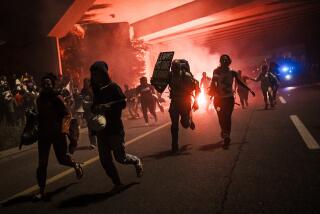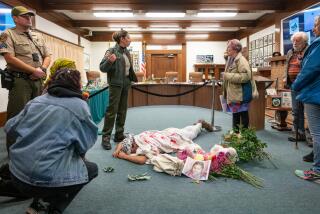Egyptians in Tahrir Square protest military’s grip
Banners waved and angry slogans echoed as tens of thousands of Egyptians protested Friday against the ruling military council, which they blame for hijacking a revolution that once bore the hope of leading the restive Arab world toward democracy.
Dominated by Islamists, with a smattering of secularists and liberals, crowds swelled into Tahrir Square in one of the largest demonstrations since longtime President Hosni Mubarak was overthrown in February. Despite competing political agendas, the factions were united in condemning the Supreme Council of the Armed Forces’ refusal to cede power to a civilian government.
The protest, which came nearly a week before parliamentary elections, was another troubling sign that Egypt has yet to find a path away from a repressive police state toward a viable democracy. The military has stifled civil liberties and appears intent on consolidating its power by manipulating the drafting of a new constitution to counter the rising influence of Islam.
What began as an uprising of promise has turned into bitterness and frustration as Egyptians — no matter how often they unfurl flags and rally in the streets — remain mired in a stunted revolt. The military hasn’t budged; rather, it has expanded martial law and locked up dissidents and political bloggers.
The generals want to “abort the revolution,” said Ibrahim Yehia, 23, a university engineering graduate and Muslim Brotherhood member. “They’re causing strife among Egyptians and they want to marginalize everyone … so they can say we’re not ready for democracy and justify staying in power.”
The vitriol directed at the military and its chief commander, Field Marshal Mohamed Hussein Tantawi, was drawn in caricatures pasted on walls and spray-painted on banners that fluttered on a chilly afternoon: “The field marshal is hallucinating, he wants to become president” and “God is great, down with military rule.”
The scene — fathers with children, painted faces, bands of roving young men — was reminiscent of the energy that swept the square during the 18 days of largely peaceful demonstrations that led to Mubarak’s fall. Even the loudspeakers crackled with protest cadences in which only the names had changed.
The demonstration was led by the Brotherhood, the nation’s best organized political movement, which is expected to win as much as 30% of parliament seats. The Brotherhood and ultraconservative Salafis say proposals by the generals to enshrine the military as the guardian of “constitutional legitimacy” would create a dictatorship that could thwart the new parliament.
The military, which may delay the presidential election until 2013, is also demanding guidelines that would allow it to select 80% of the members on the constitutional committee and ensure that the military budget is kept secret.
Tarek Abdel Rahman, a technician standing in a whorl of Egyptian flags, said the generals are attempting to put themselves beyond the law.
“No one is above the constitution,” he said. “The military shouldn’t impose anything over the people or tell them or the parliament how the constitution should be written.”
The Brotherhood fears that such constitutional guidelines would diminish the legislature it hopes to eventually control. Some secular and liberal parties endorsed the idea of guidelines to prevent Islamists from heavily infusing the constitution with Islamic law. These parties, however, have since criticized the guidelines for granting the military too much power, even though some of the proposals would protect minority rights.
“The military is afraid Islamists will win a majority of parliament and will write a constitution. But that fear disrespects our democratic rights,” said Sayed Mahmoud Abul Ela, a Salafi. “The majority of Egyptians don’t want a secular constitution and they’ve made this clear … and will make it clearer by voting for Islamists in the elections.”
The battle over the constitution is souring the atmosphere and sharpening the political divisions before the Nov. 28 elections, the first stage in three-part balloting for parliament.
Tahrir Square, regarded as the epicenter of this year’s uprisings in the region, echoed Friday with speeches by Islamists. Smaller groups of liberals and secularists waved flags as if holding ground on a sprawling battlefield.
Liberals demanded a secular state.
Islamists chanted: “The people want to implement God’s sharia.”
The military’s hold on power has intensified the political and religious differences among dozens of parties, many of them founded only months ago. It is an indication that the nation is caught in two struggles: one against the generals, and the other, a simmering showdown between Islamists and secularists over Egypt’s identity.
“The military has done a great job dividing us and that’s why today we are all separated in this square,” said Ahmed Banna, a 26-year-old dentist. “Each group carries its own demands.”
Hassan is a news assistant in The Times’ Cairo bureau.
More to Read
Start your day right
Sign up for Essential California for news, features and recommendations from the L.A. Times and beyond in your inbox six days a week.
You may occasionally receive promotional content from the Los Angeles Times.







